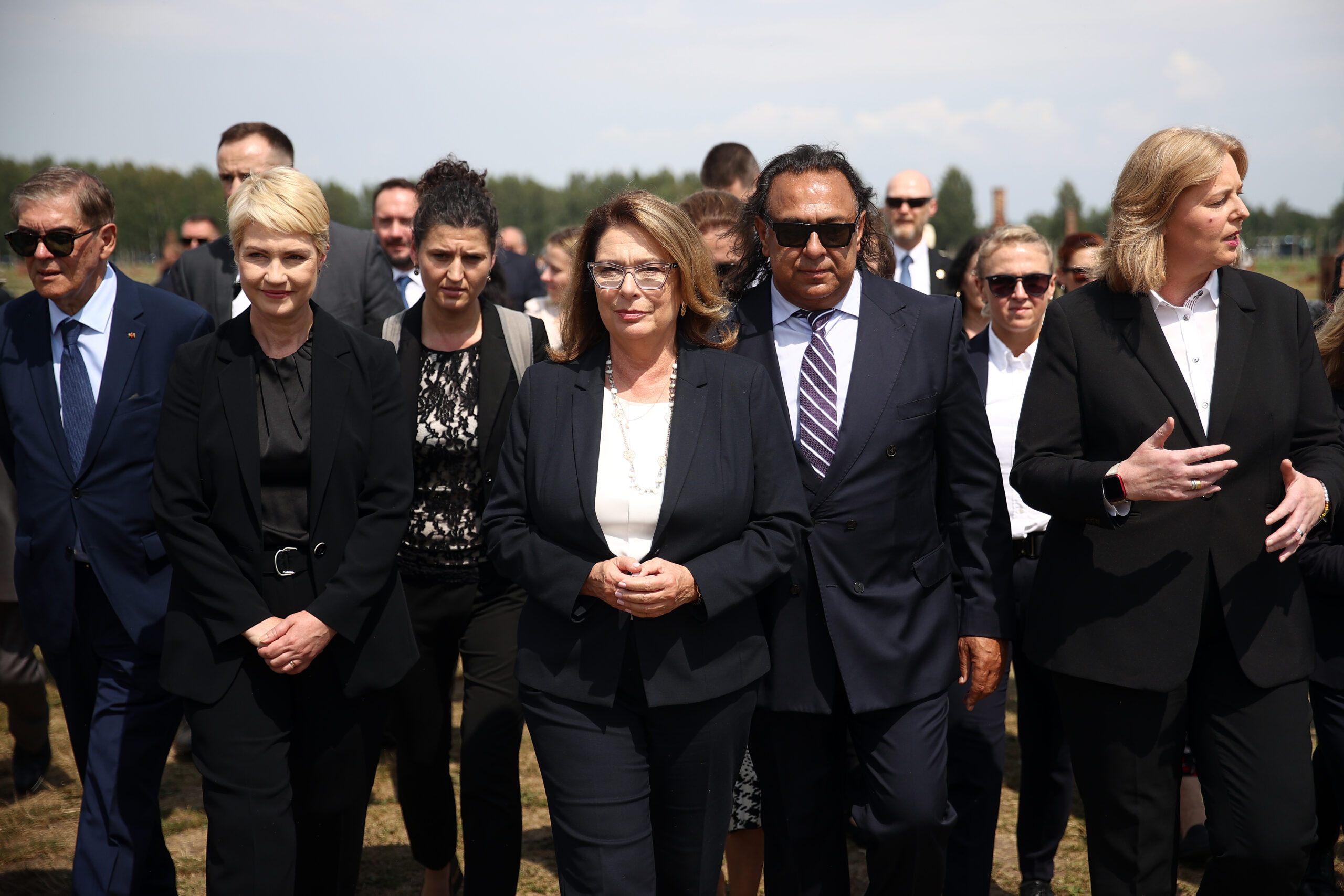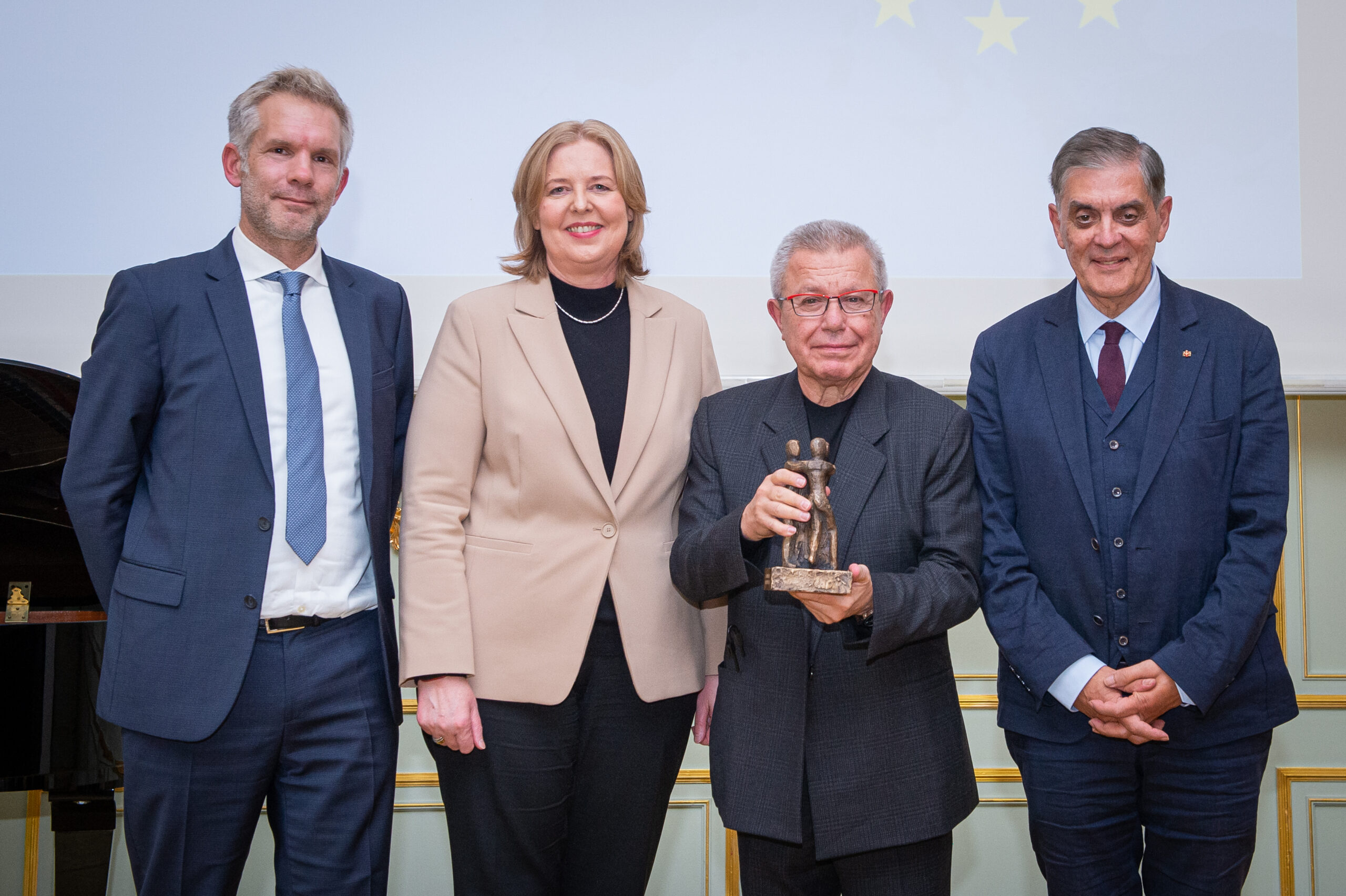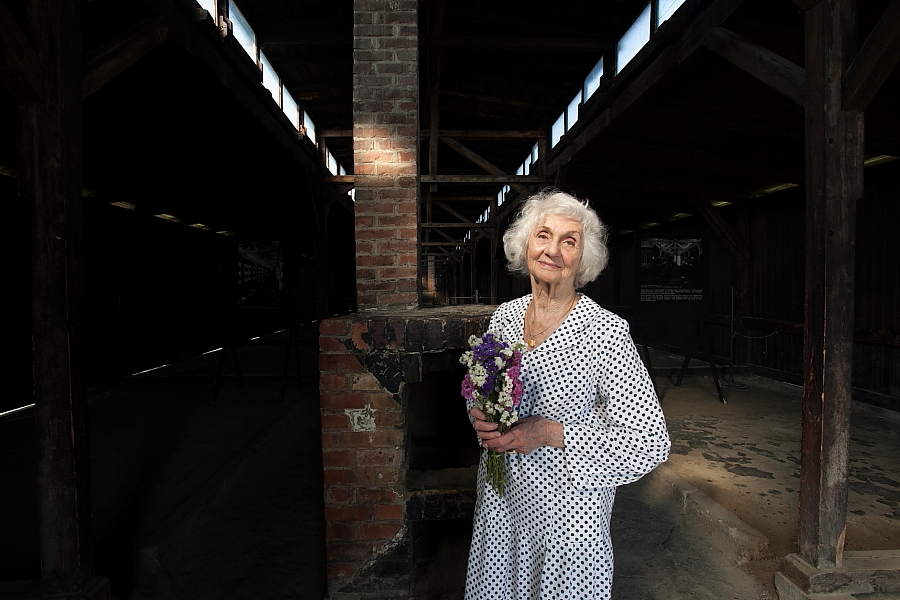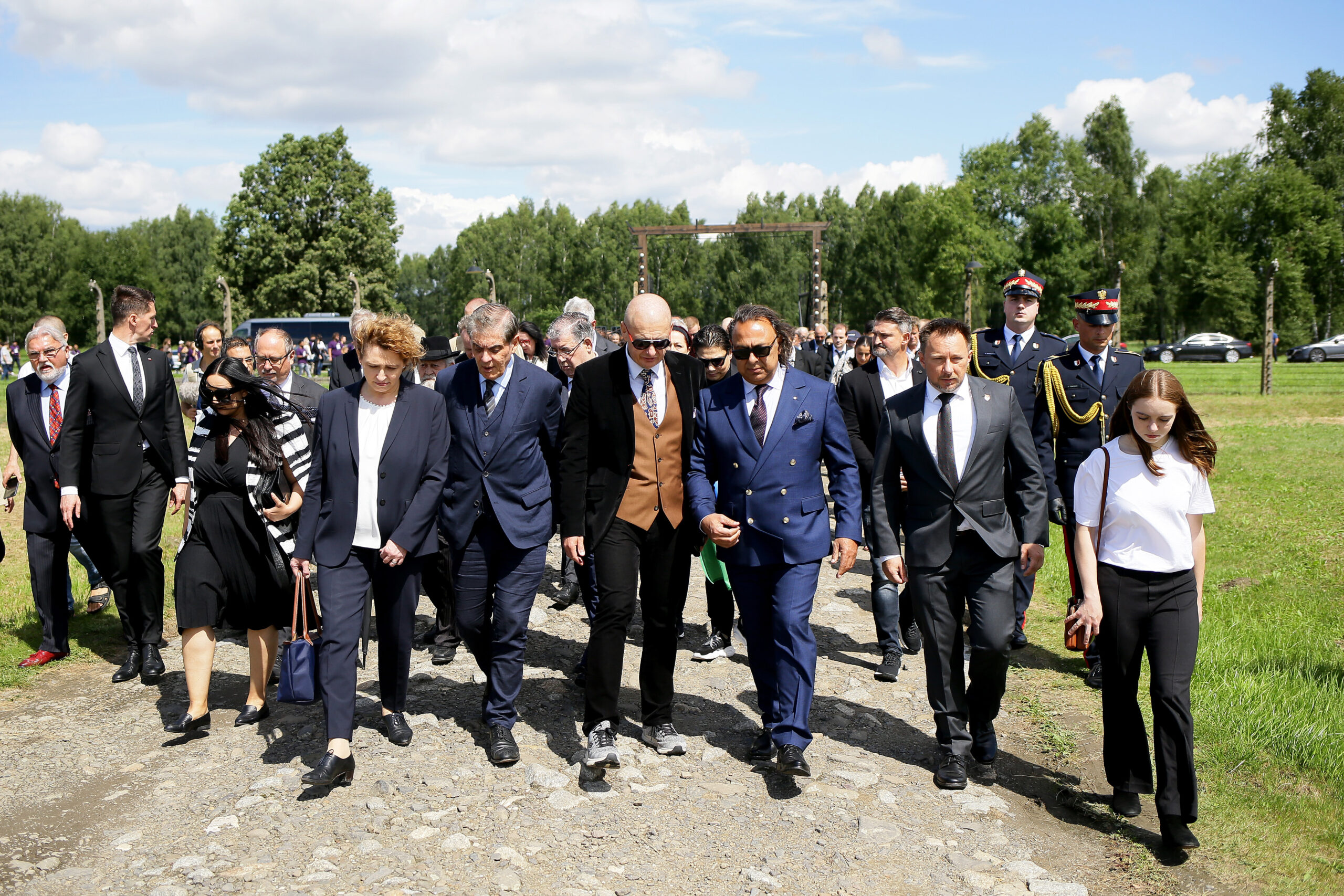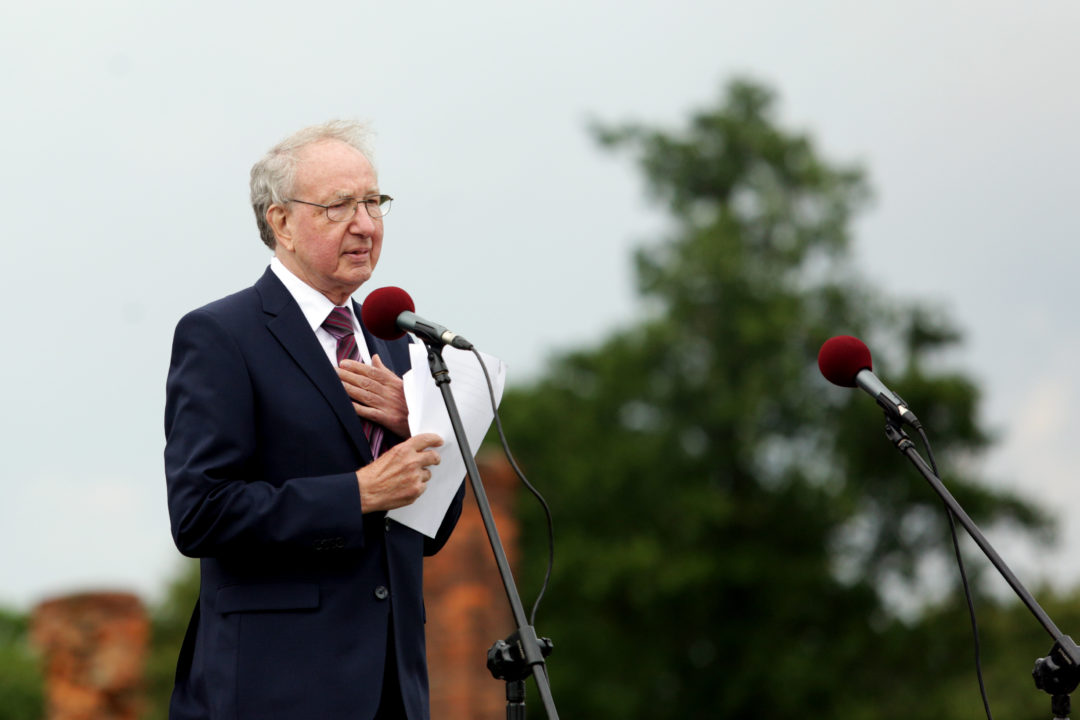The commemoration in Auschwitz and the international virtual day of remembrance as a reminder to resolutely confront antigypsyism that is once again on the rise today. Romani Rose honored with the Auschwitz Museum “Light of Remembrance” award.
On August 2, 2021, the Central Council of German Sinti and Roma together with the Documentation and Cultural Center of German Sinti and Roma commemorated the last 4,300 Sinti and Roma who were exterminated in the concentration and extermination camp Auschwitz-Birkenau 77 years ago. Murdered by the SS despite their fierce resistance. This murderous action by the Nazis is symbolic of the genocide of hundreds of thousands of Sinti and Roma in Europe.
It was only six years ago that the European Parliament designated August 2 as the European Holocaust Memorial Day for Sinti and Roma. In the meantime, violent antigypsyism is manifesting itself all over Europe, not only in the form of right-wing terrorist attacks and pogrom-like riots, but also in the form of police violence against members of the Sinti and Roma minority, as has happened recently in the Czech Republic for example.
Large parts of the Roma population still have to live in slums in Central and Southeastern Europe, amidst the countries of the European Union. They have to live in undignified conditions and endure a system of apartheid in the areas of education, housing, health care and the labor market, while the governments simply accept this situation without doing anything about it.
77 years after August 2, 1944, this situation is a scandal and must also be commemorated on the European Holocaust Memorial Day for Sinti and Roma.
Romani Rose, Chairman of the Central Council of German Sinti and Roma, emphasized the importance of remembrance for democratic societies:
‘Auschwitz is the conscience that appeals to all of us to raise our voice against the murderous racism with its numerous deaths that is once again rampant today. It must fill us with great concern when we look at the current state of the European Union. The attempt of some member states to weaken the separation of powers, the fundamental principle of the constitutional state, is staggering – especially after the experience of the crimes against humanity committed by the Nazis and the communist dictatorship in Europe.’
Werner Friedrich, who, as a child, together with his family, was persecuted by the Nazis because he was a Sinto, appealed to the young people in his speech:
‘You, young people, you are our future. You have it in your hands what will become of Germany, Europe and the whole world.’
He further warned politicians and authorities that the chapter of compensation is still not closed:
‘Our family has never received reparation for the torment and ignominy we suffered under the Nazis, except for my sister Loni, who was in the concentration camp. To this day, the West German compensation authorities say that Sinti and Roma who were lucky enough not to end up in a concentration camp or in the gas chamber had not suffered enough to receive permanent reparations.’
In addition to Romani Rose and Werner Friedrich, the further speakers were Roman Kwiatkowski for the Association of Roma in Poland, Dan Doghi for the Council of Europe, Laszlo Teleki and Irina Spataru for the youth organization ternype. The Deputy Prime Minister of Poland, Piotr Tadeusz Gliński, sent a short address.
The director of the Auschwitz-Birkenau Museum, Piotr Cywiński, also presented the Chairman of the Central Council for German Sinti and Roma, Romani Rose, with the “Light of Remembrance” award: http://auschwitz.org/en/education/light-of-remembrance/
Romani Rose received this honor because he has worked tirelessly on educating people on the Holocaust and about this part of German and European history for decades. Before Rose, Władysław Bartoszewski, Krystyna Oleksy, Avner Shalev, Serge Klarsfeld and Sara J. Bloomfield were honored with this award.
In addition to the Memorial Day ceremony held in Auschwitz, there was also a virtual commemoration for the 500,000 Sinti and Roma murdered in Nazi-occupied Europe due to the still ongoing Corona pandemic. The bilingual event (German/English) was held on August 2, 2021 and streamed on the website https://www.roma-sinti-holocaust-memorial-day.eu/ starting at noon. It is now permanently available together with a wide range of information (German/English/Polish/Romani). Furthermore, the commemoration ceremony of the Central Council of German Sinti and Roma in the former extermination camp Auschwitz-Birkenau, as every year, took place at the same time as the virtual event. Holocaust survivor Werner Friedrich held the central address.
Further quotes from the video statements and speeches
Katarina Barley, Vice President of the European Parliament:
‘If we take a look around Europe, we have to be concerned that the situation is getting worse rather than better. Additionally, some people have not learned anything from the horrifying history. Thus, it is all the more important to use such days of remembrance as an opportunity to once again remind ourselves of what we want: a common, peaceful and equal life together. Sinti and Roma as work colleagues, as neighbors, as friends. That is our goal, our common goal. This is often achieved, but not yet everywhere and every time. But always be sure that the overwhelming majority of the European Parliament and, of course, me personally, are on your side.’
Claudia Roth, Vice President of the German Bundestag:
‘Let us use this European Holocaust Memorial Day for Sinti and Roma to pay our respects to the dead and to make a pledge to the living: The murder and systematic annihilation of human life like this must never be allowed to happen again.’
Piotr Gliński, Deputy Prime Minister of the Republic of Poland, Minister of Culture and National Heritage:
‘10 years ago, on July 29, 2011, the Parliament of the Republic of Poland adopted a Special Resolution to proclaim August 2 as the Holocaust Remembrance Day for Sinti and Roma. In 2015, the European Parliament declared August 2 as the European Holocaust Remembrance Day for Sinti and Roma. To all victims of the concentration camp Auschwitz-Birkenau, I pay my utmost respect and remain deeply hopeful that the tragic experience of the ethnic group so cruelly decimated may leave a deep scar in our hearts, so that what happened to these free people will never happen again in the history of mankind.’
Anna-Nicole Heinrich, Praeses of the Synod of the Evangelical Church in Germany:
„In the Evangelical Church in Germany we will – in view of the increasing racism and nationalism – stand up with you for the democratic rule of law, and against anti-Gypsyism, anti-Semitism and all forms of racism.“
Ambassador Chris J. Lazaris, President of the International Holocaust Remembrance Alliance (IHRA):
‘This day should remind all of us of some of the darkest moments of European History. It is by remembering and education that we will continue to maintain the peace and strengthen human rights that guarantee the prosperity and the continuous advancement of all European citizens.’
Timea Junghaus, Executive Director ERIAC:
‘The lack of recognition of the Roma Holocaust reflects the longstanding discrimination faced by Sinti and Roma communities. The Roma Holocaust Memorial Day is thus an important rallying point for the community and advocates of anti-racism to challenge ongoing hate speech and violence against Roma, which persists until the present day, particularly in response to the rise of populism, antigypsyism and far-right across Europe in recent years.’
